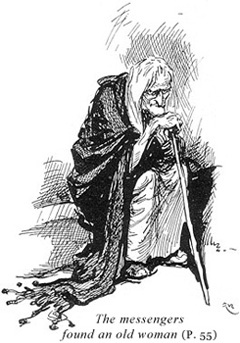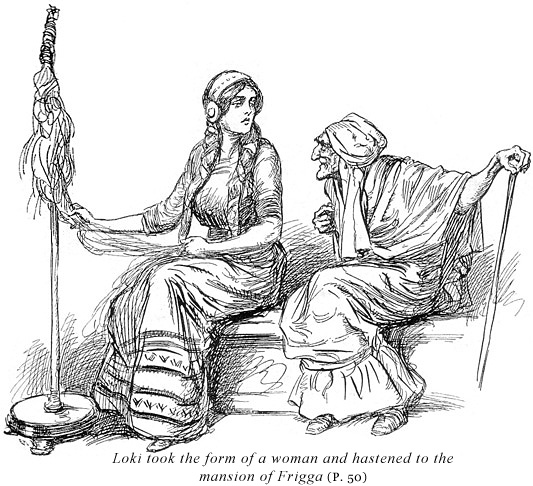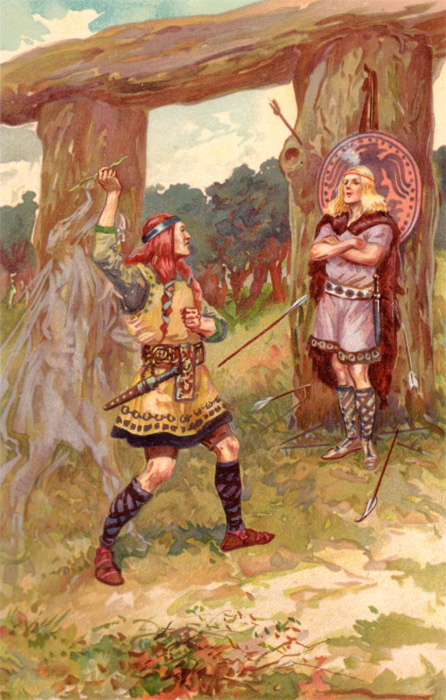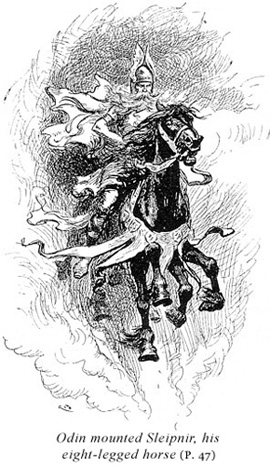|
THE STORY OF BALDUR
Now, the second son of Odin was called Baldur, and of all the gods was he the most loved. Baldur the Fair was he sometimes called and sometimes Baldur the Good. Beautiful and majestic he was in form and feature, and so bright and fair to behold that it seemed as though golden light streamed from him. No white herb, even the whitest of herbs, could compare with the whiteness of Baldur’s brow. And gentle he was, and wise, and pitiful, and a speaker of fair and gracious words. In his life there was nought but good, and in his judgments he was ever unerring and true. And Baldur’s wife was the fair and tender-hearted goddess, Nanna, and they dwelt in the great mansion called Broadbeam. A bower of radiant splendour was Broadbeam, and it was said of that abode that nothing evil could enter therein. |
|
And it came to pass that Baldur dreamed a terrible dream, and after that no dream of joy or gladness ever came to him again, but hardly was there a night when he was at rest. Night after night did strange fearsome dreams come to him that seemed warnings of some great danger threatening his life. And at last, on a time when the gods were assembled together in council, he told them of his restless nights of horror. And the gods talked long over the matter, and they questioned the wise seers of the future as to what these dreams might forebode, though well they guessed their meaning. And the seers answered that the dreams foreboded death to the dearest of all the gods. And Odin and Frigga were sore grieved at the words of the seers, and all the gods and goddesses grieved with them. And Odin, the All-Father, could not rest for his grief and the great fear which was upon him of that unknown evil which was to overwhelm his dearly-loved son. He resolved to descend into the dark underworld, into those shadowy regions presided over by Death, and there find out from one who had long been dead, and who knew all secrets, what should be Baldur’s fate, and by whom it should come. And Odin mounted Sleipnir, his eight-legged coal-black horse, and rode with all speed down the yawning steep to the drear land. And when he reached the Eastern gate, he sought the tomb of a long-dead prophetess. And when he had found it, there he sat him down awhile upon the ground. And, presently, looking about him, he saw a great |
|
hall prepared as for the coming of an honoured guest; the benches strewn; a brave feast spread; the board glittering with its burden of golden goblets filled to the brim with honey-mead. And at the sight the All-Father was troubled and his fears grew upon him. And he looked again and saw a golden bed, spread with rich coverings, and ready for the coming guest. And with dread in his heart, Odin sprang to his feet, and turned him to the north, and thrice pronounced the awful words which awaken the dead. And from the tomb there came a hollow, sullen sound, and a voice cried “What man, unknown to me, is he that wakes me? Snow has snowed on me, rain has beaten me, dew has drenched me; I have long been dead.” And Odin answered that he was an unknown traveller who would fain learn of the Prophetess certain things. And he asked for whom the great feast and the golden bed were spread. And the voice unwillingly replied: “Pain shall reach the sons of Heaven! Spread is the feast and spread is the bed for Baldur! Balder must die!” |
|
And as the voice faded away, Odin cried again with a great cry, and commanded the Prophetess to speak again and tell him what was the danger that awaited Baldur, and who should bring it upon him. And the voice answered: “In Hödur’s hand the hero’s doom! Hödur will be Baldur’s slayer, and rob Odin’s son of life.” And at these words Odin leapt to his feet in horror, and to I now before him passed a long procession of women, white-veiled and solemn, who bent their mournful brows to the earth, and tore their golden tresses, while the air re-echoed their wail of woe. And in anguish, the All-Father turned upon the Prophetess, mocking at her, and denying her power of prophecy. But the voice answered him that nought should save Baldur from his doom. And Odin hastened from the spot. And he mounted Sleipnir, and returned to Asgard, downcast and sorrowful. And Odin told the words of the Prophetess to the gods in council, and long they talked together, hoping to find some way of escape. And Frigga advised that they should exact a solemn oath from all things that they would do no harm to Baldur. And so it was done. And fire and water, iron and all the metals, stones, earths, diseases, poisons, beasts, birds, and creeping things all cheerfully swore the oath to the goddess Frigga. Then were the gods once more at rest, for they believed that they had turned aside the doom which threatened the beloved Baldur. And so sure were the gods of Baldur’s safety, that now it became their favourite pastime to make |
|
Baldur stand up as a mark at their meetings, while some hurled darts at him, some threw stones, and others even struck at him with their swords and battleaxes. And never did harm come to Baldur from any of these exploits, for all things were true to the oath they had given. But Loki, the evil god, looked on at these pastimes with malice in his heart towards Baldur, whom all things so loved, and he longed for his hurt and his downfall. And on a day as he sullenly watched the gods shooting at Baldur, he determined to question the goddess Frigga, who had taken the oath from all things, so that he might find out if there was anything that had not sworn the oath. So he took the form of a woman, and hastened to the mansion of Frigga, and when he was come unto her, he drew her into talk concerning the gods and their doings. And Frigga asked what the gods were then doing, and the pretended woman replied that they were hurling weapons and stones at Baldur, none of which harmed him. “Ay,” said the goddess, “metal nor wood shall not hurt Baldur, for I have taken an oath from them.” And the woman said: “Have all things then sworn to spare Baldur?” And Frigga answered: “All things but one; and that is a tender little shrub that grows on the eastern side of Valhalla, and is called the mistletoe. That I thought too young and feeble to crave an oath from.” And as soon as he could after hearing this, Loki hurried away. And he took upon him his own shape, |
|
and went to the place where Frigga had told him the mistletoe grew. And high above the meadows he saw it, slender and fair, and he cut it off, and took it to the spot where the gods were still amusing themselves with their favourite sport.  And Loki saw Hödur, the blind god, standing apart from the rest, for he could not share in the game because of his blindness. And he went up to Hödur and said: “Why dolt thou not throw something at Baldur?” And Hödur answered: “Because I am blind, and |
|
see not where Baldur stands, neither have I anything to throw.” Then said Loki: “Thou must do as the others, and show honour to Baldur. Here is a twig; come, shoot it at Baldur. I will guide thine arm towards the place where he stands.” And Hödur took the mistletoe from Loki and Loki guided his arm, and he hurled it at Baldur. And with a sharp cry Baldur fell dead, and all the gods stood still and speechless with horror. And after some moments they turned and looked in each other’s faces, and all were of one mind to lay hands on him who had done that deed, the direst deed that had ever been wrought by gods or men. But they durst not lay hands on him there, for that meeting-place was sacred. Then did they break out into loud lamentations, yet not one was able to speak the grief that was in his heart. But greatest of all was the sorrow of Odin and Frigga, and Nanna the wife of Baldur, and they bowed them down and wept aloud. And when some of her anguish was spent, Frigga raised herself and cried: “Who is here that would gain my love and good will? Let him then ride to Hela, and offer her a ransom, that Baldur, my son, may return again to Asgard.” And Hermod, the son of Odin, the humble and eager-hearted god, answered that he would do her will and undertake the journey. And they brought swift Sleipnir, the horse of Odin, and Hermod mounted him, and he galloped away. Then did the gods raise the body of Baldur and sorrowfully they bore it to the seashore. There stood |
|

|
|
Baldur’s ship, “Ring-horn,” the greatest of all ships. And when the ship was launched, they prepared the bale or funeral fire and placed the body of Baldur upon it. Then came Odin, and Frigga with him, and Nanna, and Frey, in his car drawn by a boar, and Freyja in her chariot drawn by cats, and all the gods and goddesses and many Frost giants and Mountain giants. And when Nanna saw the body of Baldur laid upon the ship she stretched out her arms to him, and gave a great wail of agony, so that her heart broke, and she fell dead. And the gods lifted her and placed her body beside Baldur’s on the bale-fire. And they brought also Baldur’s horse, in all his richest trappings, and him, too, they led to the fire. And the flames were kindled. And Odin flung into them the precious gold ring called Draupnir, which had the power of producing, every ninth night, eight rings like itself. Meanwhile, Hermod rode on in all haste to the land ruled over by Hela. For nine days and nine nights he rode through glens so gloomy that he could discern nothing around him. Then he came to a loud roaring river, and rode over it on a glittering golden bridge which trembled under him. And the maiden who kept the bridge asked him his name and who he was. And she told him that the day before five troops of dead persons had ridden over the bridge, and had not shaken it as much as he alone. “But why dost thou ride to the region of Death?” she asked. “Thou hast yet the bloom of Life on thee.” “I would find Baldur,” answered Hermod. “Has he yet passed this way?” |
|
And she answered “Yea,” and showed him the way he must take. Then on went Hermod, and at last he came to the barred gates of the dark land. And he leapt from Sleipnir, and tightened the saddle-girths, and remounting, spurred him forward so fiercely that he cleared the great gates without even touching them. And on he rode again until he came to the palace of Hela. And he dismounted and entered the great hall. And there sat Baldur in the high seat. And there, too, was Nanna. And they rejoiced at their meeting, and talked together long into the night. And in the morning Hermod sought Hela, and prayed her to set Baldur free from that dread land of shadows, telling her that in Asgard was there nothing heard but the sound of sorrow and wailing. And Hela answered: “It shall be put to proof whether Baldur is so beloved as is said of him. Therefore, if it be found that all things, living and dead, weep for Baldur, then shall he return to Asgard, but if there be even one thing that shall speak against him, or refuse to weep for him, he shall remain in this land.” And Hermod rose and returned to Baldur, and told him the words of Hela. Then did he array himself for departure. And the horse Sleipnir was brought. And Baldur and Nanna led Hermod out and bade him farewell. And Nanna sent rich gifts to Frigga, and Baldur sent to Odin the ring Draupnir as a keepsake. Then Hermod rode forth, and came again after long journeying to Asgard, and he told the gods all that had befallen him in the land of Hela, and the words |
|
which Hela had spoken, and the gods rejoiced in the hope that Baldur should return to them again. And without delay they sent messengers forth throughout the world begging all things to weep so that Baldur might be delivered from Death. And right willingly did all things weep, men and all other living things, and earths, and stones, and rocks, and trees, and metals. And the messengers turned back full of content at their success. But on their way they found an old woman sitting in a cavern, and to her also they made their request. And the hag looked sullenly upon them and muttered: “Let Hela keep what is hers; nought but dry tears will I weep for Baldur: what is he to me?” And though they besought her again and again, no other answer would she give. Now did they return in sorrow to the gods. And when their story was told, many among them believed that the hag was no other then Loki himself, who had changed his shape, and put himself in their way, to work more evil against the gods. And never more did Baldur return to Asgard. But it was foretold that when the gods and men and Heaven and Earth had passed away, there should arise a new earth, lovely and verdant, and Baldur should live again with many others he had known in Asgard. Then should they rejoice together in happy converse, in remembrance of former knowledge, of perils undergone, and fights well fought, and all the grief of their past parting should be forgotten. |

|

|

|
